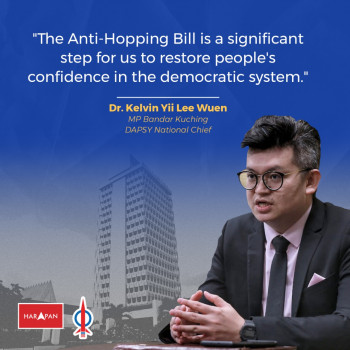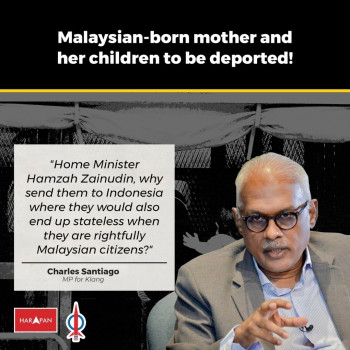 KUALA LUMPUR, 27 November 2012- Inspired by Italian Member of Parliament Licia Ronzulli, Serdang MP Teo Nie Ching decided to bring her 4-month old baby, Jinger to Parliament today to highlight the plight of working mothers.
KUALA LUMPUR, 27 November 2012- Inspired by Italian Member of Parliament Licia Ronzulli, Serdang MP Teo Nie Ching decided to bring her 4-month old baby, Jinger to Parliament today to highlight the plight of working mothers.
“We in Pakatan Rakyat demand that the BN government pay more attention to assist working mothers in Malaysia. As a start, we would like to see childcare centres set up in all government agencies, if the government is serious about their target to increase female labour force participation rate to 55% by 2015,” Teo told the media.
In a press conference flanked by MP for Lembah Pantai, Nurul Izzah Anwar and MP for Bukit Mertajam, Chong Eng, Teo decried the lack of childcare facilities in Parliament, the symbol of democracy and rights in our country.
A mother of two herself, Nurul Izzah applauded Teo’s initiative as it brings home the plight of mothers in Malaysia.
“In 2009 I gave birth to little Harith. The very same year I made an application to parliament for a breast-feeding room – for the use of all nursing mothers working in parliament. Unfortunately, the room was not equipped with a crèche nor the necessary parliamentary standing orders that allow children in the vicinity of parliament,” Nurul said.
As at today, only 71 childcare centres have been established at various government agencies and 20 in the private sector for working mothers[2]. This is far from sufficient and is highly unsatisfactory. Like others in various parts of the world, working mothers in Malaysia need urgent attention and assistance.
“It is unsurprising that many women leave their jobs in the middle of their careers once they have children because Malaysia’s workplaces are still not mother-friendly,” Teo said.
A Parliamentarian, A Mother
Licia Ronzulli is an Italian Member of the European Parliament (MEP) who made waves two years ago when she brought her infant daughter to work.
On 22 September 2010, Ronzulli took her 44-day old daughter, Vittoria, to a plenary session of the European Parliament as a symbolic gesture to reclaim more rights for women in reconciling work and family life. She has continued to bring her daughter to work since then.
During one interview Ronzulli said her decision to bring baby Vittoria to work was not a “political gesture but a maternal one” based on the fact that she was still breastfeeding. She nonetheless said she wanted to“remind people that there are women who do not have this opportunity (to bring their children to work), that we should do something to talk about this”.

Walking the Line
Increasing female labour force participation requires balancing their competing responsibilities within the family and the workplace.
“Among other things, we need safe and high-quality childcare facilities at the workplace so that women do not need to leave the workplace in order to raise their children,” Teo said.
Even though Malaysia produces more female than male graduates in recent years[1], the increase of women’s participation in the labour workforce is very low. It was 44.7% in 1995 and at 2011, the female labour force participation rate in Malaysia stood at 47.9%.
This is in sharp contrast to the neighbouring South East Asian countries of Thailand, Singapore and Brunei Darussalam where the corresponding figures are 71%, 63% and 60%, respectively.
Childcare Facilities – Investing in the Future
Investment in childcare centres will benefit the country long-term, as rightly pointed out by the World Development Report 2012 on Gender Equality and Development, as it improves women’s access to jobs and economic opportunities – this move could significantly boost productivity in the region.
Furthermore, the 2010 Asia-Pacific Human Development Report (AHDR) estimates that if the female employment rates were raised to 70%, Malaysia would enjoy an increase in GDP of between 2% and 4%.
Therefore, it is imperative that the BN government pay more attention to initiatives that will boost the female labour force as well as implement programmes that will benefit the economy as a whole. – The Rocket



